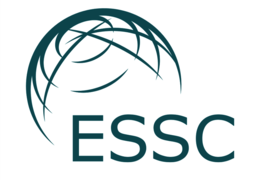ESSC
Link to the dedicated ESSC website

Europe’s advisor on space science and policy
Mission
The European Space Sciences Committee (ESSC) was established in 1974, as a means to establish an independent voice and leadership role for European space scientists in the international space arena. The ESSC is an Expert Board hosted and administered by the European Science Foundation.
The European Space Sciences Committee provides impartial scientific advice to the European Space Agency, the European Commission, European national space agencies, and other decision-makers in the space domain.
They strive to be the reference body in Europe for independent expertise on matters of space science, acting as a representative voice of the European space science community and promoting international cooperation in the field.
Vision
ESSC Vision is to be widely established as an authentic and trusted voice of the European Space Sciences Community, recognized for their expertise in the field of space sciences, promoting fundamental, use-inspired, and applied space research, seeking to ensure maximum scientific benefits of Europe’s investments in the space domain (including the commercial sector), and increasing interest in and support for space sciences in the general public, the private sector, and the media.
Membership, Structure, and Funders
ESSC members are acknowledged experts in all fields of space research and are nominated on the basis of their expertise, experience and achievements within the science community.
The ESSC is currently chaired by Professor Chris Rapley (University College London, UK) and includes 27 members across four panels:
ASTRONOMY AND FUNDAMENTAL PHYSICS PANEL - AFP
- Nabila Aghanim - Panel Chair (Université Paris-Sud, FR), cosmology CMB, reionisation, galaxy clusters
- Fabrizio Fiore (INAF-Astronomical Observatory of Trieste), High Energy Astrophysics, Extragalactic Astrophysics
- Ravit Helled (Center for Theoretical Astrophysics & Cosmology, University of Zurich, CH), exoplanets
- Saskia Hekker (HITS, Zentrum für Astronomie, University of Heidelberg, DE), stellar physics
- Nikolaos Karnesis (Aristotle University of Thessaloniki, GR), gravitational waves, astronomy
- Xavier Luri (University of Barcelona, ES), astrometry
- Floris van der Tak (SRON,NL), infrared & instrumentation
EARTH SCIENCES PANEL - ESP
- Anny Cazenave - Panel Chair (Laboratoire d’Etudes en Géophysique et Océanographie Spatiales, LEGOS, FR), oceanography, hydrology and climate, altimetry & space gravimetry
- Maurice Borgeaud (Retired, former Head of Department at ESA, CH), Earth observation, Microwave land imaging
- Jonathan Bamber (University of Bristol, UK), Earth observation
- Gustau Camps-Valls (University of Valencia, ES), machine learning, earth observation
- Michaela Hegglin (University of Reading, UK), Earth observations, atmospheric composition & transport, chemistry-climate coupling
- Yann Kerr(CESBIO,FR), SMOS mission, land hydrology, land surfaces
- Sindy Sterckx(VITO, BE), optical instrumentation and cal/val
LIFE AND PHYSICAL SCIENCES PANEL - LPS
- Alexander Chouker - Panel Chair (Hospital of the Ludwig Maximilian University, DE), integrated physiology
- Kai Bongs (DLR, DE), quantum physics, atom interferometry, optical clocks
- Luca Cipelletti (Université de Montpellier, FR), soft matter, colloids
- László Gránásy (Wigner Research Center for Physics, HU), Numerical modelling
- Marc Heppener (Consultant, FR), human spaceflight and exploration
- Ann-Iren Kittang Jost(CIRiS, NTNU Social Research, NO), plants, interdisciplinary research, payload integration, operation
- Zita Martins (Instituto Superior Técnico, IST, PT), astrobiology, cosmochemistry
- Nicola Montano (University of Milano, UNIMI, IT) neurophysiology, internal medicine
- Charlot Vandevoorde (GSI Helmholtz Center for Heavy Ion Research in Darmstadt, DE), radiobiology
SOLAR SYSTEM AND EXPLORATION PANEL - SSEP
- Mahesh Anand - Panel Chair (The Open University, UK), moon
- Vinciane Debaille, (ULB, BE), solar system composition, geochemistry, exploration
- Sonia Fornasier, (LESIA, Université Paris Cité, FR), small solar system bodies
- Mauro Messerotti(INAF-Astronomical Observatory of Trieste, IT), space-geospace interactions, space weather, solar radio physics and radio astronomy
- Christina Plainaki (ASI, IT), Outer Planets and icy moons, planetary space weather
- Nicole Schmitz (DLR, DE), missions, instrumentation
- Michel Viso (Senior Scientific advisor at Innovaxiom, FR), Astrobiology, Exobiology
The ESSC Executive Board is composed of the ESSC Chair, the 4 Panel Chairs, the Treasurer (Marc Heppener) and Serge Flamenbaum as an adviser in Space Systems R&D, technology and innovation.
FUNDERS
The work of the ESSC is financially supported by the following Member Organisations:
- Agenzia Spaziale Italiana (ASI), Italy
- Centre national d’Etudes Spatiales (CNES), France
- Consejo Superior de Investigaciones Cientificas (CSIC), Spain
- European Space Agency (ESA) Europe
- Fonds de la Recherche Scientifique (FNR), Luxembourg
- Fonds National de la Recherche Scientifique (FNRS), Belgium
- Fonds zur Förderung der Wissenschaftlichen Forschung (FWF), Austria
- Fonds voor Wetenschappelijk Onderzoek (FWO), Belgium
- Helmholtz Gemeinschaft (HGF), Germany
- National Observatory of Athens (NOA), Greece
- Netherlands Institute for Space Research (SRON), Netherlands
- Norges Forskningsråd (RCN) and the Norwegian Space Agency (NOSA), Norway
- Schweizerischer Nationalfonds (SNF), Switzerland
- Suomen Akatemia/Finlands Akademi (AKA), Finland
- Swedish National Space Agency (SNSA), Sweden
- UK Space Agency, United Kingdom
Please see all the news on the ESSC website dedicated page
MEDIA
Website: http://essc.esf.org/
Twitter: @ESSC_media
